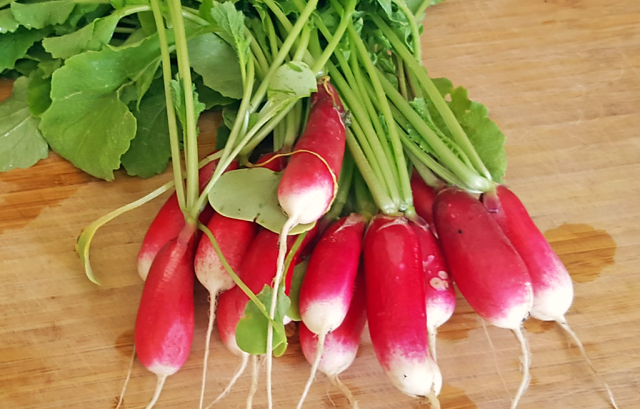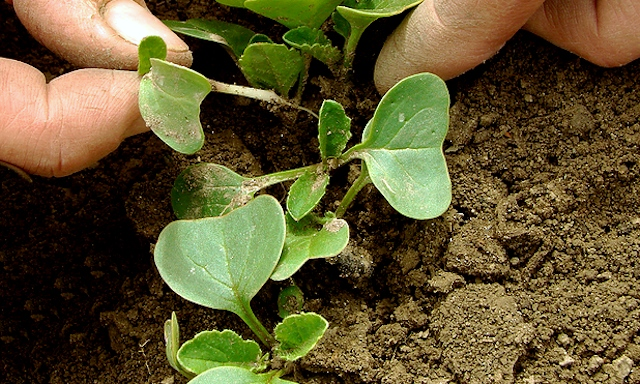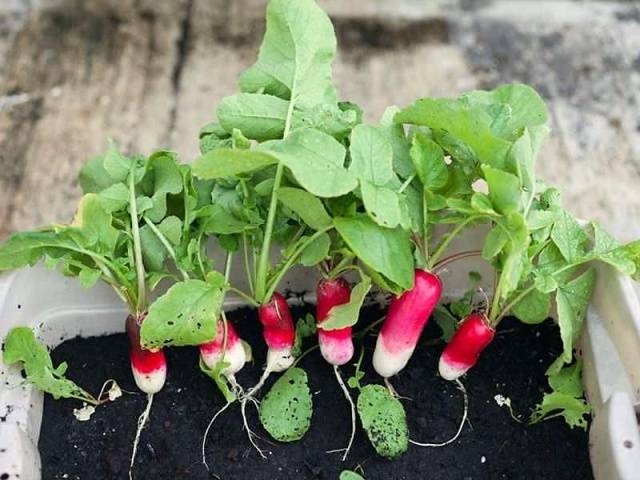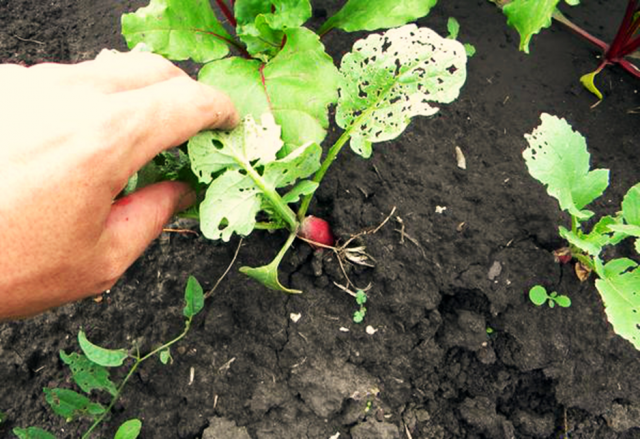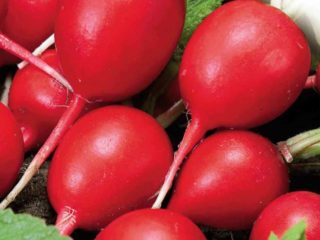Content
With the onset of spring, the body's need for fresh vegetables wakes up, and I just really want to crunch a delicious radish, which is one of the first in a hurry to please with the harvest in the spring beds.
Description
"French breakfast" refers to an early, annual variety. From the moment the first shoots appear and until the fruit is fully ripe, only three weeks pass. The root crop grows mainly in length, and not in width.
The fruits of the "French breakfast" variety are neat, elongated-cylindrical, bright scarlet with a white tip. Weight from 15 to 40 g, length from 5 to 15 cm. Radish pulp is white, juicy, dense and without bitterness.
The French breakfast radish has a compact rosette of leaves. Leaves, like root vegetables, have no bitterness and are used to make salads.
This radish variety is often used for re-seeding and can be produced from April to September.
Advantages and disadvantages
The variety with such a beautiful name "French breakfast" has many advantages, and relatively insignificant disadvantages, for this reason it is loved by gardeners.
Seed preparation for sowing
Radish seeds of this variety intended for the greenhouse are not subject to additional processing. But those that will be sown in the ground need to be approached more carefully. French breakfast radish seeds are selected based on their size and weight.
You can also place radish seeds in a 5% salt solution. Those that float up - remove, and rinse the rest with running water and soak, placing for several days until they hatch, in a damp cloth or gauze.
Growing features
The French breakfast radish is grown all year round. From April to September - in the garden. And the rest of the time - in the greenhouse. The main thing is to adhere to the basic rules of care, and then the French breakfast radish will delight you with a good harvest:
- Compliance with the temperature regime.
- Timely watering.
- Loosening the soil.
- Compliance with lighting standards.
In the open field
For planting radishes in the open field, it is better to choose fertile, sunny, sufficiently heated areas with a low nitrogen content.
The sowing of the French breakfast radish is carried out all season, with a break of 14-21 days, so that the radish delights with delicious root crops for a longer time. The seeds of the "French breakfast" germinate already at a temperature of + 2C °, but the most suitable temperature for the formation of a root crop is about + 18C °.
Radish seeds of this variety are sown in moistened grooves to a depth of about 1.5 cm. The width between the rows should be 15-20 cm. It is advisable to leave the gap between the seeds of the "French breakfast" 5 cm. Such a planting avoids seedling thinning. Before the first shoots appear, the bed with root crops is covered with plastic wrap, and it can be removed during the day.
Watering the French breakfast radish is done about twice a week, and every other day it is necessary to loosen the soil.
In the greenhouse
In greenhouses, when planting radish of the French breakfast variety, biological heating methods are often used - a layer of dead manure is poured onto the soil, and a layer of earth is sprinkled on top. But if winter is going to be frosty, then it is better to stock up on heating devices.
Although this variety is resistant to cold weather, the soil temperature should not fall below + 2 ° C. It is better to sow radishes using the 6 × 6 spot method to a depth of approximately 1 cm. On average, 4.5 g of seeds are consumed per 1 m².
Caring for greenhouse seedlings is similar to caring for this type of radish, planted in open ground.
Growing problems
In general, the radish of this variety is quite unpretentious, and the main problems of growing are violation of the rules of care.
Problems | Causes |
Seeds do not sprout | Poor seed quality Deep seeding |
No root crop is formed | Dense crops Waterlogging of the beds Insufficient lighting The presence of nitrogen in the soil |
Bitter fruits | Uneven hydration |
Radish burst | A sharp drop in moisture in the garden |
Abundant leaf growth and flowering | Excessively frequent weeding, loosening, thinning, excess fertilizer. |
Diseases and pests
It is very important to fertilize and fertilize this radish variety on time, the procedures strengthen its immunity.
Diseases | Signs of defeat | Control methods / prevention |
Powdery mildew (fungal disease) | Mealy bloom on the ground part of the radish. Deformation and drying of leaves.
| Treatment with fungicides or Bordeaux liquid. |
Vascular bacteriosis | Blackening of veins on foliage Yellowing, crumbling and falling of leaves.
| Spraying with 1% Bordeaux liquid solution |
Keela (fungal disease) | Withering and yellowing of foliage Spherical growths on the roots. | Processing with a solution of fluffy lime (240 g per 10 l) |
Blackleg | Deformation and yellowing of foliage. Blackening at the base of the rosette. | Avoid neglect in plantings Processing with a solution of 16 g of copper sulfate and 50 g of ordinary laundry soap |
In addition to diseases, this type of radish is also annoyed by pests.
Pests | Signs of defeat | Control methods / prevention |
Cruciferous flea | Gnawed fragments of leaves. The plant stops growing and dries up. The appearance of small black bugs. | Timely feeding of the beds with slurry. Powder treatment from tobacco dust and wood ash (once a week) |
Cruciferous bug | The appearance of bugs with orange stripes. Drying of the root crop. | Spraying with henbane infusion. Treatment of the plant with an infusion of dope ordinary. |
Belyanka | The appearance of caterpillars eating leaves. | Treatment with a solution of 4 tbsp. l. mustard, 4 tbsp. l. salt, 2 tsp. chili powder in a bucket of water. |
Cabbage fly and cabbage moth | The appearance of larvae feeding on the juice of the root crop. Withering of the plant. | Spraying with karbofos. Processing with biological products. Autumn harvesting of plant residues. |
Conclusion
Obviously, with little effort and minimum costs, you can get a tasty and vitamin product in a fairly short time. And how pleasant it is to watch the family gobble up their own-grown radishes for breakfast. And physical activity in the fresh air is pretty good and free fitness.
A few tips from the author of the video:
